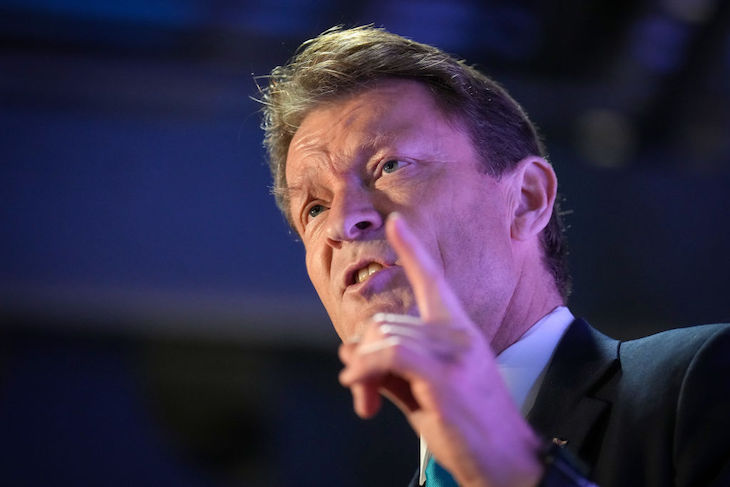While Michelle O’Neill and Emma Pengelly, the First and Deputy First Minister of Northern Ireland, were in Washington last week for their annual St Patrick’s Day pat on the head from the Biden administration, a more subversive gathering was taking place in Kells, a small village in Country Antrim.
Traditional Unionist Voice, the party fronted by Jim Allister, was holding its annual conference. For most observers this would fail to register, but the announcement that the TUV has entered into a pact with Reform UK – including running agreed candidates at the general election in Northern Ireland – brought it wider attention.
The blame will rest squarely with the DUP
At the heart of the agreement is putting the DUP’s ‘acceptance of the Irish Sea border’ under scrutiny at the election. Predictably, the idea of a third unionist electoral force – after all, at the 2022 Assembly elections, the TUV increased its share of the vote – has led to dark mutterings about ‘splitting the vote’. The Belfast Telegraph has predicted that three current DUP constituencies would be under serious threat should a TUV-Reform candidate stand against them.
If anyone is to blame, however, for the division of unionism it is not Jim Allister or Traditional Unionist Voice, but Sir Jeffrey Donaldson and the DUP. Given their odd decision to oversell their supposed achievements in reducing the impact of the border in the Irish sea, it was evident that it would lead to a reaction. To borrow a phrase beloved of the DUP’s founder Ian Paisley, those who sow dragon’s teeth shall reap the whirlwind.
Many of those decrying the decision of the TUV to partner with Reform have pointed with much merriment to the fact that, when they were MEPs, both its leader Richard Tice and Ben Habib voted for the agreement which instituted the sea border. Predictable accusations of perfidious types from Albion using over-egged support for Ulster as a political fig leaf have followed.
However, their actions subsequently – especially Habib – in providing intellectual ballast for the arguments against the government’s trajectory and eventual DUP acquiescence to it, have been more forthright and impactful than anything many of the so-called sceptics in the DUP have achieved.
It is notable that none of the party’s big beasts have felt compelled to escalate their discontent with Donaldson’s deal beyond aggrieved speeches in the Commons. Indeed, Sammy Wilson, one of those MPs identified as being potentially at risk at the election, has gone as far to claim the TUV are in a pact with ‘pan-nationalism,’ quite the claim given who his party sit in government with.
The honeymoon period which the revived devolved executive has enjoyed has been a triumph of style; DUP ministers playing Gaelic sports on visits to schools has given the semblance of a new, grown-up attitude to governance.
However, questions of substance remain. This week, the DUP will attempt to veto a new EU law applying to Northern Ireland, a test of the so-called brakes contained within the Windsor Framework. Its failure – given the value the DUP have placed on these measures – would simply be grist to the mill for the TUV and Reform and prove their point around the weakness of the deal achieved by Donaldson.
While questions remain about the ability of Reform to cut through at a national level given the vagaries of first past the post, their involvement in Northern Ireland is a welcome intervention. The presence of the so-called national parties is anaemic; the branch office run by the Conservatives seems purely to exist to lose deposits at elections while Labour do not even deign to stand in Northern Ireland.
Beyond the constitution, plenty of Northern Irish voters share the same concerns their counterparts in the rest of the UK do about the failures of the Conservatives, from open borders to faltering public services. This is an opportunity for them to stake their claim in that discussion.
If this partnership does lead to the splitting of the unionist vote at the next election, the blame will rest squarely with the DUP. For without their consistently poor handling of unionism’s fortunes, there would be no need for this pact to exist at all.






Comments